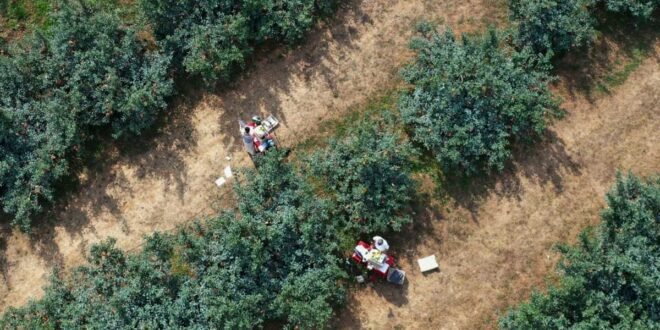The New Era of Chinese Farmers: Embracing Technology for Success
In a rapidly evolving agricultural landscape, Gao Chaorong understands the importance of producing high-quality crops such as sweet potatoes, peanuts, and wheat. However, she has come to realize that merely growing good produce is no longer sufficient to capture the attention of China’s tech-savvy consumers. To prevent her crops from going unsold, the 56-year-old farmer has returned to school, enrolling in a “hands-on livestreaming bootcamp” designed to teach her how to connect directly with consumers through mobile phones.
Gao and her peers are part of a growing movement known as “new farmers”—individuals who leverage modern technology to enhance agricultural production and services. This trend reflects a broader shift in rural China, where traditional farming methods are being supplemented by digital tools to meet the demands of an increasingly connected population.
The Rise of Digital Agriculture
The number of new rural creators on China’s TikTok-like app Douyin has increased by 52% over the past year, driven by the desire to tap into the country’s one billion internet users. On platforms like Xiaohongshu, the hashtag “new farmers” has been viewed over 227 million times, highlighting the growing interest in this movement.
Local authorities have also recognized the potential of digital agriculture, sending officials to learn livestreaming techniques and assist farmers in transitioning to online sales. Chen Xichuan, a Communist Party cadre in Pingdu, Shandong, has taken on the role of helping farmers adapt to this new reality. During a live broadcast, he demonstrated a ripe green pear, encouraging viewers to take it home and make fresh juice for their children.
Livestreaming as a Marketing Tool
With Chinese consumers increasingly purchasing everything from clothing to garlic online, livestreaming has become a vital marketing platform for farmers. It allows for direct engagement with customers, enabling them to make purchases with just a click of a button while also commenting or asking questions during live broadcasts.
The Tian sisters, who are both livestreamers and e-commerce experts, organize monthly training camps for aspiring farmers. These sessions, costing around 5,000 yuan ($698), include four days of intensive lessons and ongoing support. Students learn how to captivate audiences using compelling scripts, props, and visually appealing backgrounds.
During a classroom session, Gao demonstrated her ability to speak confidently about cooking eggplants, showcasing the skills she has acquired. Teacher Tian Dongying emphasized the importance of understanding the audience, noting that even small improvements can lead to significant success.
Overcoming Challenges
Despite the opportunities presented by digital agriculture, challenges remain. Many farmers, like Gao, find it difficult to adapt to new technologies. She mentioned that while younger generations may find it easy to navigate digital tools, older farmers must put in twice the effort to learn these skills.
Tian Chunying, principal of the livestreaming school, highlighted the increasing importance of agriculture in China. With industries like real estate becoming less prosperous and unemployment rising, agriculture is becoming a cornerstone for supporting the population. President Xi Jinping has prioritized rural revitalization since 2012, emphasizing the critical role of agriculture in China’s development.
Changing Perceptions of Rural Life
Digital tools like livestreaming have transformed public perceptions of rural life in China. Pan Wang, an associate professor at Australia’s University of New South Wales, noted that traditionally, Chinese farmers were seen as working long hours under harsh conditions, disconnected from technology. However, the rise of digital agriculture is challenging these stereotypes, showcasing a more dynamic and innovative side of rural life.
As farmers like Gao continue to embrace technology, they are not only improving their livelihoods but also reshaping the future of agriculture in China. Their journey reflects a broader transformation, where innovation and tradition converge to create new opportunities in the agricultural sector.
 Info Malang Raya Its All About World News
Info Malang Raya Its All About World News




